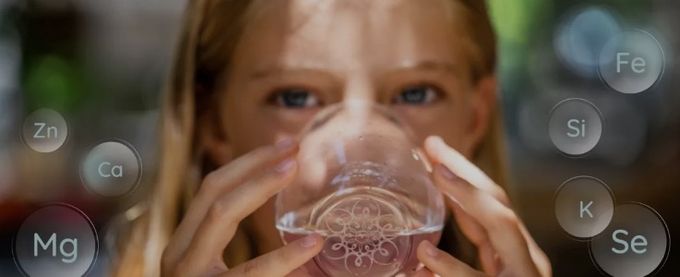Is Mineral Water Good for You? Explaining the Benefits
Discover the unique composition and health benefits of mineral water and understand how it can help you maintain optimal hydration and improve overall wellness
Updated July 15, 2024

Mineral water is known for its clean, crisp taste; however, for many, the appeal goes deeper. It's seen as a natural way to boost hydration and mineral intake and potentially even address health concerns. But is there truth to the hype? Let's explore mineral water, its composition, and how it can contribute to a healthier you.
» Want the benefits of mineral water at home? Add mineral drops to your water
Mineral Water vs. Regular Water
Unlike treated and filtered tap water, mineral water acquires its unique mineral content from underground sources through various geological processes.
Geological processes like groundwater flow dissolve minerals as water travels through rock layers. Similarly, water stored in aquifers acquires minerals from the surrounding geology. Finally, temperature changes, freezing and thawing, and acidic rain help release minerals from rocks.
Its unique composition influences taste and texture. Depending on the specific mineral balance, it can offer health benefits like improved digestion, bone health, and hydration. This sets it apart from regular water.
» Find out whether sodium in bottled water is good for you
Different Types of Mineral Water
While all mineral water boasts naturally occurring minerals, it can be categorized into distinct types based on its source and composition.
Natural Mineral Water
Natural mineral water comes from protected underground sources and contains a consistent mineral composition. It is filtered through geological formations and is rich in essential minerals. It must be bottled at the source to maintain its mineral consistency and composition.
Spring Water
Spring water emerges naturally from the ground and is filtered through rock and soil. While containing some minerals, it generally has a lower sodium content than mineral water. Spring water offers hydration and some mineral intake but to a lesser extent than natural mineral water.
Sparkling Mineral Water
There are two types of sparkling mineral water: naturally and artificially carbonated.
- Naturally Carbonated: This water is naturally fizzy due to underground geological activity, where CO2 is absorbed from volcanic regions or similar sources. It retains the minerals and benefits of its origin.
- Artificially Carbonated: Here, CO2 is injected to create the fizz. While offering hydration, it may not provide the same mineral benefits as naturally sparkling varieties.
Note that both types of sparkling mineral water can cause bloating and discomfort if consumed excessively, as they contain excess carbonic acid.
» Understand whether spring water is structured water
Key Minerals Found in Mineral Water
Here's a breakdown of some essential minerals you might find in your water and their ideal concentrations:
- Calcium (Ca): 20–80 mg/L
- Magnesium (Mg): 10–50 mg/L
- Potassium (K): 1–5 mg/L
- Bicarbonate (HCO3): 100–300 mg/L
- Sodium (Na): 10–50 mg/L
» Check out how to get the essential minerals your body needs
Why Choose Mineral Water?
1. Hydration
Mineral water, packed with electrolytes like calcium, magnesium, potassium, and sodium, offers superior hydration to regular water. These minerals regulate fluid balance within cells, ensuring optimal hydration throughout your body. This mainly benefits athletes, people in hot climates, or those with high sweat rates.
Daily consumption of 1–2 liters of water can significantly improve hydration within days.
» Check whether you're dehydrated by following these steps to check at home
2. Bone Health
Calcium and magnesium are essential minerals for strong bones throughout life. They work together to maximize bone density and prevent osteoporosis. Ensuring adequate intake of these minerals can benefit children, adolescents, postmenopausal women, and older adults.
Magnesium goes beyond just absorption. It helps convert vitamin D to its active form and influences bone density by promoting hydroxyapatite formation, an essential bone mineral component. Bicarbonates also help maintain a healthy pH level in the body, which is crucial for bone health.
Note that a consistent intake of these minerals over several months is necessary to see noticeable improvements in bone health.
» Discover how to naturally increase the pH of drinking water
3. Digestive Health
Bicarbonate-rich mineral waters are known for their digestive benefits. First, their alkaline nature helps neutralize stomach acid, reducing discomfort from heartburn and acid reflux. It may stimulate the release of digestive hormones, aiding overall gut function.
Additionally, magnesium can contribute to healthy muscle function, including the muscles in your intestines.
For individuals with digestive issues, bicarbonate mineral water daily can provide noticeable relief within a few weeks.
» Find out if mineral water is good for your liver too
4. Cardiovascular Health
Several minerals play a vital role in keeping your heart healthy.
- Magnesium regulates heart rhythm, prevents irregular heartbeats, and promotes the relaxation of blood vessels.
- Calcium contributes to healthy blood pressure by maintaining the tone of your blood vessels.
- Potassium counteracts the effects of sodium, helping your blood vessels relax and promoting healthy blood pressure. This is especially beneficial for people with hypertension or existing cardiovascular concerns.
- Bicarbonate mineral water may improve heart health by reducing total cholesterol, fasting glucose, and LDL cholesterol.
» Learn how dehydration can affect your heart health
5. Muscle Function
Magnesium acts as a natural calcium blocker, aiding relaxation after contractions. Calcium is crucial for muscle function, working with proteins to control contraction and relaxation cycles. Together, they prevent muscle spasms and keep movement efficient.
Potassium, on the other hand, regulates muscle contractions and nerve signals by maintaining electrical gradients across cell membranes. Deficiency in potassium can manifest as muscle weakness and cramping.
While not directly involved in muscle movement, sodium also contributes by regulating fluid balance and nerve impulses, indirectly impacting muscle function.
These minerals are essential for athletes and those with demanding physical routines who experience more significant muscle stress and fatigue.
» Make sure you're replenishing lost electrolytes after exercise
7. Skin Health
Mineral water boasts a unique blend of minerals that work wonders for your skin.
- Calcium strengthens the skin's barrier, preventing dehydration
- Magnesium retains moisture, keeping it supple
- Silica promotes collagen production for a youthful appearance
- Selenium protects skin cells from damage
Mineral water can also aid detoxification by flushing out toxins, promoting overall skin health. Its hydrating, anti-inflammatory effects, and detoxification make it a valuable tool in your skincare routine.
» Discover how drinking water improves skin aging
Potential Downsides of Mineral Water
While mineral water offers benefits, there are also some downsides to consider.
- Mineral Overload: Excessive sodium, calcium, and magnesium intake can lead to hypertension, kidney stones, and digestive problems. This is especially true for people with pre-existing health conditions. Try to moderate and monitor your intake.
- Contaminants: If sourced from areas with environmental concerns, it may contain impurities like heavy metals or pollutants. These can lead to toxicity and long-term health problems. Choose reputable brands with proper certifications and regular testing to minimize this risk.
- Digestive Discomfort: The high mineral content can trigger bloating, diarrhea, or constipation, especially for sensitive stomachs. You should introduce it slowly and adjust your intake based on your body's response.
- Unsustainable: The environmental impact of bottled water is a growing concern. Microplastics from the bottles themselves can potentially leach into the water, and the transportation and manufacturing processes leave a significant carbon footprint.
» Check out these sustainable alternatives to bottled water
Choosing Mineral Water for Your Needs
With the wide variety of options available, knowing your needs can help you pick the perfect bottle. Here's how to make an informed choice.
» Learn how to choose the healthiest type of water to drink
- Read the Label: Look for the specific minerals listed. For instance, choose a low-sodium option if you're watching your sodium intake. If bone health is a concern, opt for water with a higher calcium content.
- Consider Your Health: People with kidney problems might want to avoid mineral-rich water. Athletes may benefit from water with a good balance of electrolytes to help with hydration during exercise.
- Talk to Your Doctor: A healthcare professional can advise you on the best mineral content for your specific dietary needs and health conditions.
- Look for Certification: Ensure water is certified and undergoes regular testing for safety and purity. This ensures you're getting a high-quality product.
Tailored Minerals for Optimal Health
As awareness of health and wellness grows, the popularity of mineral water has surged. People are drawn to its perceived natural origins and potential health benefits, seeking a simple way to boost mineral intake.
However, the environmental impact cannot be ignored. From production and transportation to disposal, plastic bottles contribute heavily to carbon emissions and plastic pollution. Microplastics can also leach from bottles into the water, negating some health benefits.
MAYU Minerals offer a convenient solution to enhance tap water's mineral profile. They ensure the right balance of essential minerals without the environmental impact. The easy-to-use, sugar-free formula delivers a balanced mix of essential minerals for optimal hydration and supports overall health. Made from high-quality, natural ingredients, these drops are free from artificial additives, making them a safe and effective way to elevate your everyday water.
» For a sustainable and plastic-free alternative to mineral water, try MAYU Mineral Drops

















































